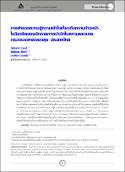บทคัดย่อ
การวิจัยเชิงสำรวจนี้มีวัตถุประสงค์เพื่อศึกษาระดับความรู้ความเข้าใจเกี่ยวกับโครงสร้างตำแหน่งและเส้นทางความก้าวหน้าในวิชาชีพของนักกายภาพบำบัดในสถานพยาบาลภาครัฐ กระทรวงสาธารณสุข ศึกษาความสัมพันธ์ระหว่างปัจจัยส่วนบุคคลกับระดับความรู้ความเข้าใจ และสำรวจอุปสรรคต่อความก้าวหน้าในวิชาชีพ เก็บข้อมูลด้วยแบบสอบถามออนไลน์จากกลุ่มตัวอย่างนักกายภาพบำบัด 534 คน ซึ่งได้มาจากการสุ่มแบบแบ่งชั้นภูมิตามภูมิภาคและขนาดโรงพยาบาล ผลการวิจัยพบว่า ความรู้ความเข้าใจด้านโครงสร้างตำแหน่งและเส้นทางความก้าวหน้ามีคะแนนเฉลี่ย 3.12±0.78 (คะแนนเต็ม 5 คะแนน) และด้านการจัดทำผลงานวิชาการมีคะแนนเฉลี่ย 2.83±0.84 ซึ่งอยู่ในระดับปานกลาง การวิเคราะห์ความสัมพันธ์พบว่า ปัจจัยส่วนบุคคลทุกด้านมีความสัมพันธ์ในระดับต่ำมากกับระดับความรู้ความเข้าใจ โดยพบความสัมพันธ์ที่มีนัยสำคัญทางสถิติระหว่างประสบการณ์การทำงานกับความรู้ความเข้าใจ ด้านคุณสมบัติเฉพาะและเส้นทางความก้าวหน้า (rs = -0.0991, p < 0.05) และระหว่างตำแหน่งงานกับความรู้ความเข้าใจด้านการเขียนผลงานวิชาการ (rs = 0.0867, p < 0.05) อุปสรรคสำคัญที่พบ ได้แก่ โครงสร้างและระบบการบริหารงาน ภาระงานและการจัดการเวลา และความรู้และทักษะในการทำผลงานวิชาการ ผลการวิจัยนี้สามารถใช้เป็นข้อมูลพื้นฐานในการพัฒนาระบบสนับสนุนที่เข้มแข็ง การปรับสมดุลภาระงาน และการเสริมสร้างทักษะด้านวิชาการเพื่อส่งเสริมความก้าวหน้าในวิชาชีพกายภาพบำบัดอย่างยั่งยืน
บทคัดย่อ
This survey research aimed to examine knowledge and understanding of position structure and
career paths among physical therapists in public hospitals under the Ministry of Public Health, Thailand;
to study relationships between personal factors and levels of knowledge and understanding; and to
identify barriers to career advancement. Data were collected using an online questionnaire from 534
physical therapists, selected through stratified random sampling by region and hospital size. Results
showed moderate levels of knowledge and understanding in both position structure and career paths
(mean 3.12 ± 0.78 out of full score 5) and academic work production (mean 2.83 ± 0.84). Correlation
analysis revealed significant but very low relationships between work experience and understanding of
position qualifications and career paths (rs = -0.0991, p < 0.05), and between current position and
understanding of academic writing (rs = 0.0867, p < 0.05). Major barriers identified included organizational
structure and management systems, workload and time management, and knowledge and skills in
academic work production. These findings can serve as foundational data for developing robust support
systems, adjusting workload balance, and enhancing academic skills to promote sustainable career
advancement in physical therapy profession.


